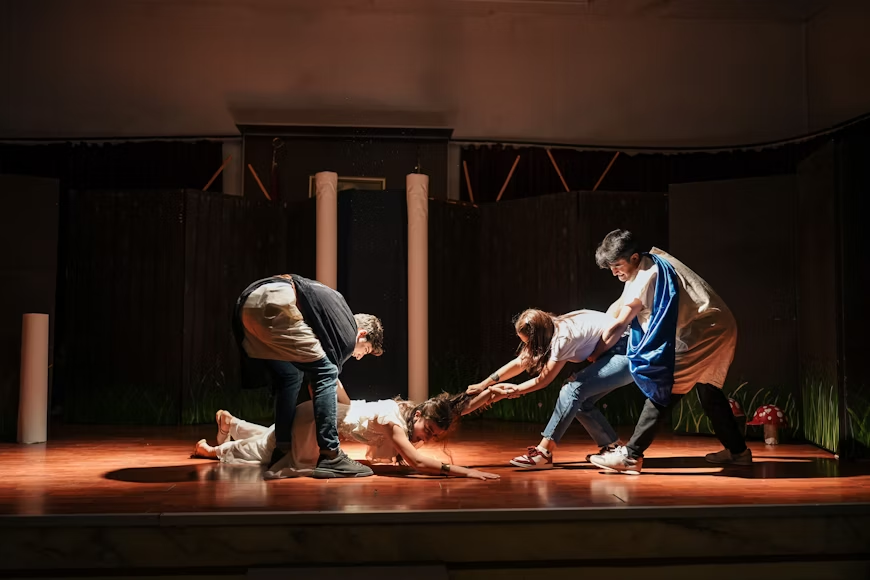Drama and Theatre
Meaning of Drama
Drama is a type of performance where people act out real or imagined events in front of an audience. It is done using spoken words, actions, gestures, and sometimes music or dance. The aim is to tell a story, teach a lesson, or entertain. Drama shows life as it is or as it could be, using characters to express emotions, struggles, or ideas.
In drama, the performers are called actors or actresses, and the place where the performance happens is usually called the stage. Everything they say and do is guided by a written script called a play.
Meaning of Theatre
Theatre is the building or space where drama is performed, but it also means the complete art of putting a drama into action. This includes acting, directing, stage designing, costuming, lighting, music, makeup, and the presence of an audience.
So, while drama is the story and action, theatre is the combination of everything needed to bring that story to life on stage.
Elements of Drama
Drama has many important parts (called elements) that work together to make the story come alive. These include:
- Plot – This is the main story of the drama. It shows how events happen from the beginning to the end. It has a beginning (introduction), a middle (conflict or problem), and an end (solution or resolution).
- Characters – These are the people or roles being acted in the drama. Every character has a purpose or role to play in the story.
- Dialogue – This refers to the words spoken by the characters in the play. Good dialogue helps the audience understand the story and the characters' emotions.
- Conflict – This is the problem or struggle in the drama. It can be a fight between people, a challenge, or an emotional problem. Conflict makes the story interesting and keeps the audience engaged.
- Theme – This is the main idea or message of the drama. It could be love, hate, greed, peace, poverty, honesty, or betrayal — depending on what the play is teaching.
- Setting – This shows where and when the story takes place. It tells whether the drama is happening in the past, present, or future, and in what location — like a village, school, or city.
- Mood and Atmosphere – This is the emotional feeling the drama creates. It could be sad, joyful, scary, or tense.
- Costume and Makeup – These help show what kind of person each character is. Costumes are the clothes the actors wear, while makeup changes their appearance to look older, younger, sick, poor, or rich.
- Stage Direction – These are instructions in the script that tell the actors what to do, where to go, or how to speak and act. It also tells where props should be placed.
- Sound and Music – Sounds and background music make the play feel more real. For example, thunder sounds in a storm scene or sad music in an emotional moment.
Types of Drama
- Tragedy – This is a serious drama that usually ends in sorrow or death. It shows the downfall of a character because of a mistake, weakness, or fate. Example: a drama where a king loses his throne due to pride.
- Comedy – A funny drama meant to make people laugh. It shows characters in silly or amusing situations and usually ends happily.
- Tragicomedy – A mix of tragedy and comedy. It contains serious moments and funny ones, and it may have a sad or happy ending.
- Melodrama – A drama that is full of emotions, exaggeration, and shocking events. It may have clear heroes and villains and aims to make the audience feel deep emotions.
- Historical Drama – A play that is based on real events or people from history. It teaches lessons and helps us remember our past.
- Religious Drama – These are dramas that talk about spiritual beliefs, moral teachings, and religious values. They are common during Easter, Christmas, or Muslim festivals.
Functions or Importance of Drama and Theatre in Society
- Entertainment – Drama gives people joy and relaxation after a long day. Watching a play can make people laugh, cry, or feel excited.
- Education – Through drama, people learn important lessons about life, history, health, values, and more. Teachers even use drama in the classroom to help students remember things.
- Communication – Drama is a powerful way to pass messages to people. Stories in plays can speak to people’s hearts and help them understand situations better.
- Social Correction – Many plays are written to correct bad behaviors in society like corruption, violence, or dishonesty. It helps people change their ways by seeing the results of their actions.
- Preservation of Culture – Drama helps us keep our cultural values, stories, language, songs, and dances alive. Traditional drama reminds us of our roots.
- Creation of Jobs – The theatre industry creates jobs for actors, makeup artists, scriptwriters, directors, costumers, sound engineers, and more.
- Promotes National Unity – Drama helps bring people of different tribes and religions together. National plays or movies often show the strength of Nigeria’s diversity.
- Healing and Therapy – Drama can be used to heal emotional wounds or mental stress. Some people find peace or healing by acting out their feelings.


